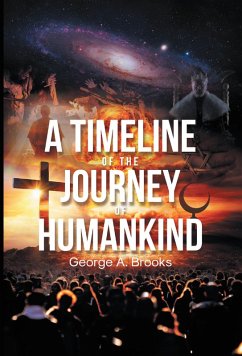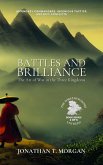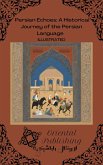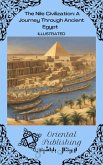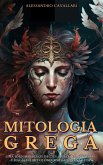The story of humankind begins 13.8 billion years ago when the universe came into being instantly everywhere at the same time. There was only darkness until the stars began to light up. This begins the long journey of humankind, through the formation in supernovae of the elements that will form our bodies to the formation of the sun, the earth, and the moon until our home brings forth life.
Our planet has survived numerous events that threatened to extinguish that life, but ultimately our most remote ancestors began to walk the plains, mountains, and valleys of Africa. In remote prehistory, groups of people migrated out of Africa eventually to populate the whole world.
The author provides a timeline for the major events that eventually shaped the modern world. In the earliest settlements, humans domesticated plants and animals. Over time, they formed city-states. Civilizations rose and fell, passing along little snippets of knowledge to those who followed. The journey acquaints the reader with these great civilizations and the people who gave us the arts and sciences and the rules of law for living together. The civilizations of Athens and Rome became the foundation of western civilization.
In the last two thousand years, world history is dominated by the spread of Christianity. Therefore, the journey takes us through those events in Judea to the kings, queens, popes, and emperors of Europe while events are also unfolding in Africa, the Middle East, Asia, and the Americas.
The modern world has been largely shaped by the colonial period beginning about 1500 AD. Much attention is given to events since then which are proximate to the world we experience today. World Wars I and II then shaped most of the modern nation states in which we live.
The author allows the reader to stand apart and be an observer of the journey of humankind. We have taken many different paths to arrive in the modern world with wonderfully diverse appearances, languages, and traditions, but we are all one family. The author hopes we will embrace our differences and act together as the family we are while shaping the future.
Our planet has survived numerous events that threatened to extinguish that life, but ultimately our most remote ancestors began to walk the plains, mountains, and valleys of Africa. In remote prehistory, groups of people migrated out of Africa eventually to populate the whole world.
The author provides a timeline for the major events that eventually shaped the modern world. In the earliest settlements, humans domesticated plants and animals. Over time, they formed city-states. Civilizations rose and fell, passing along little snippets of knowledge to those who followed. The journey acquaints the reader with these great civilizations and the people who gave us the arts and sciences and the rules of law for living together. The civilizations of Athens and Rome became the foundation of western civilization.
In the last two thousand years, world history is dominated by the spread of Christianity. Therefore, the journey takes us through those events in Judea to the kings, queens, popes, and emperors of Europe while events are also unfolding in Africa, the Middle East, Asia, and the Americas.
The modern world has been largely shaped by the colonial period beginning about 1500 AD. Much attention is given to events since then which are proximate to the world we experience today. World Wars I and II then shaped most of the modern nation states in which we live.
The author allows the reader to stand apart and be an observer of the journey of humankind. We have taken many different paths to arrive in the modern world with wonderfully diverse appearances, languages, and traditions, but we are all one family. The author hopes we will embrace our differences and act together as the family we are while shaping the future.
Dieser Download kann aus rechtlichen Gründen nur mit Rechnungsadresse in A, D ausgeliefert werden.

